
Bruce Bower has written about the behavioral sciences since 1984. He often writes about psychology, anthropology, archaeology and mental health issues. Bruce has a master's degree in psychology from Pepperdine University and a master's degree in journalism from the University of Missouri. Following an internship at Science News in 1981, he worked as a reporter at Psychiatric News, a publication of the American Psychiatric Association, until joining Science News as a staff writer. In 1996, the American Psychological Association appointed Bruce a Science Writer Fellow, with a grant to visit psychological scientists of his own choosing. Early stints as an aide in a day school for children and teenagers with severe psychological problems and as a counselor in a drug diversion center provided Bruce with a surprisingly good background for a career in science journalism.

Trustworthy journalism comes at a price.
Scientists and journalists share a core belief in questioning, observing and verifying to reach the truth. Science News reports on crucial research and discovery across science disciplines. We need your financial support to make it happen – every contribution makes a difference.
All Stories by Bruce Bower
-
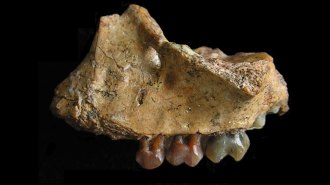 Anthropology
AnthropologyFossil finds put gibbons in Asia as early as 8 million years ago
Specimens from China raise questions about the evolutionary ID of an even older ape tooth from India.
-
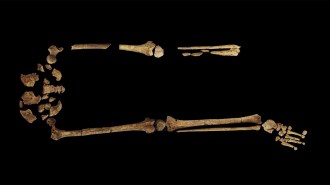 Anthropology
AnthropologyThe oldest known surgical amputation occurred 31,000 years ago
A young adult on the island of Borneo survived a lower left leg removal thanks to medically savvy rainforest surgeons.
-
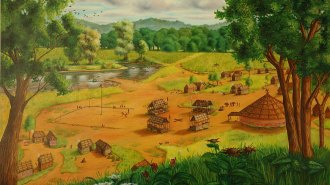 Archaeology
ArchaeologyIndigenous Americans ruled democratically long before the U.S. did
Oklahoma’s Muscogee people, among others, promoted rule by the people long before the U.S. Constitution was written.
-
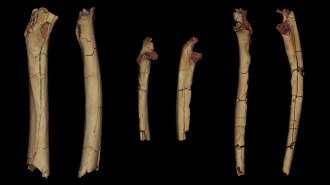 Anthropology
Anthropology7-million-year-old limb fossils may be from the earliest known hominid
An earlier report on one of the bones of a 7-million-year-old creature that may have walked upright has triggered scientific misconduct charges.
-
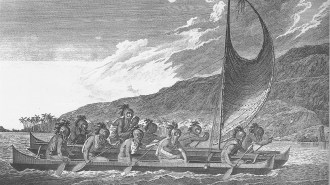 Anthropology
Anthropology‘The Five-Million-Year Odyssey’ reveals how migration shaped humankind
A globe-trotting trek through history shows how past population migrations changed the course of human biology and culture.
-
 Anthropology
AnthropologyFamine and disease may have driven ancient Europeans’ lactose tolerance
Dealing with food shortages and infections over thousands of years, not widespread milk consumption, may be how an ability to digest dairy evolved.
-
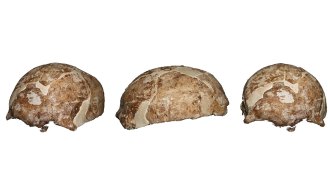 Humans
HumansAncient DNA links an East Asian Homo sapiens woman to early Americans
Genetic clues point to a Late Stone Age trek from southwestern China to North America.
-
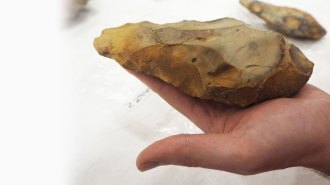 Archaeology
ArchaeologyBritons’ tools from 560,000 years ago have emerged from gravel pits
A new study confirms that an archaeological site in southeastern England called Fordwich is one of the oldest hominid sites in the country.
-
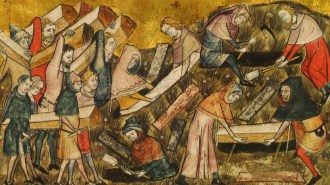 Archaeology
ArchaeologyAncient bacterial DNA hints Europe’s Black Death started in Central Asia
Archaeological and genetic data pin the origins of Europe’s 1346–1353 bubonic plague to a bacterial strain found in graves in Asia from the 1330s.
-
 Anthropology
AnthropologyA new origin story for domesticated chickens starts in rice fields 3,500 years ago
Chickens, popular on today’s menus, got their start in Southeast Asia surprisingly recently, probably as exotic or revered animals, researchers say.
-
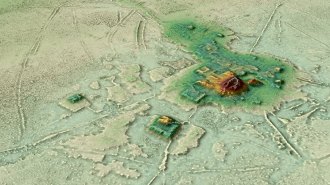 Archaeology
ArchaeologyLasers reveal ancient urban sprawl hidden in the Amazon
South America’s Casarabe culture built a network of large and small settlements in what’s now Bolivia centuries before the Spanish arrived.
-
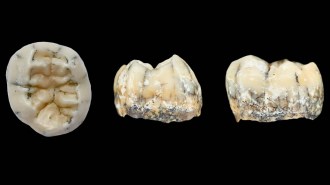 Anthropology
AnthropologyA Denisovan girl’s fossil tooth may have been unearthed in Laos
A molar adds to suspicions that mysterious hominids called Denisovans inhabited Southeast Asia's tropical forests.